Burt A. The Evolution of the British Empire and Commonwealth From the American Revolution
Подождите немного. Документ загружается.

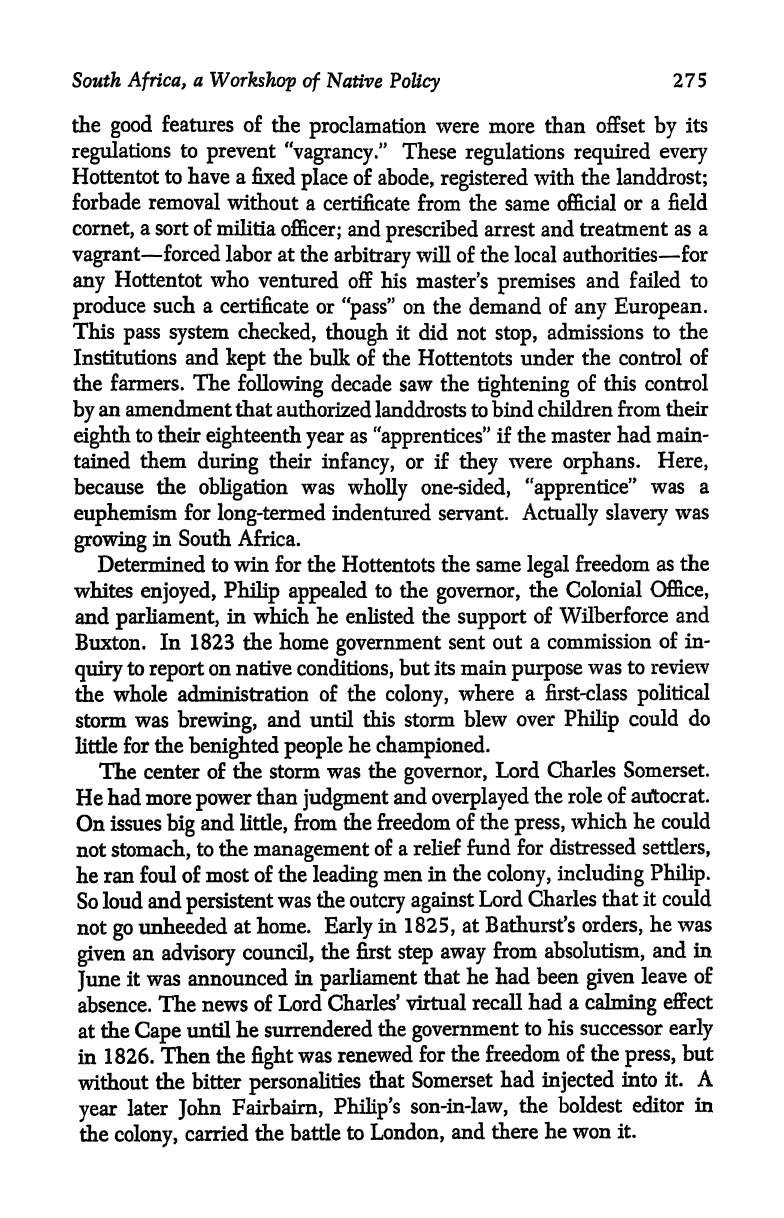
South
Africa,
a
Workshop
of
Native
Policy
275
the
good
features of
the
proclamation
were
more
than
offset
by
its
regulations
to
prevent
"vagrancy."
These
regulations
required
every
Hottentot to have
a
fixed
place
of
abode,
registered
with the
landdrost;
forbade removal
without
a
certificate from the same official
or
a field
cornet,
a
sort of militia
officer;
and
prescribed
arrest and
treatment
as
a
vagrant
forced
labor
at
the
arbitrary
will of the
local authorities
for
any
Hottentot
who
ventured off
his master's
premises
and
failed
to
produce
such
a
certificate or
"pass"
on the
demand
of
any European.
This
pass
system
checked,
though
it
did
not
stop,
admissions
to
the
Institutions
and
kept
the
bulk
of the
Hottentots under
the
control
of
the
fanners.
The
following
decade
saw
the
tightening
of
this
control
by
an
amendment that
authorized landdrosts
to bind
children
from
their
eighth
to their
eighteenth
year
as
"apprentices"
if
the
master
had
main-
tained
them
during
their
infancy,
or if
they
were
orphans.
Here,
because
the
obligation
was
wholly
one-sided,
"apprentice"
was
a
euphemism
for
long-termed
indentured servant.
Actually
slavery
was
growing
in
South
Africa.
Determined
to win for
the
Hottentots
the same
legal
freedom
as
the
whites
enjoyed, Philip
appealed
to
the
governor,
the
Colonial
Office,
and
parliament,
in
which
he
enlisted
the
support
of
Wilberforce
and
Buxton.
In 1823
the
home
government
sent
out
a commission
of
in-
quiry
to
report
on native
conditions,
but
its
main
purpose
was to
review
the whole
administration
of the
colony,
where
a first-class
political
storm
was
brewing,
and
until this storm
blew
over
Philip
could
do
little
for
the
benighted
people
he
championed.
The center
of
the
storm
was
the
governor,
Lord
Charles
Somerset.
He
had more
power
than
judgment
and
overplayed
the
role of
atftocrat.
On
issues
big
and
little,
from
the freedom
of
the
press,
which
he could
not
stomach,
to the
management
of
a
relief
fund
for distressed
settlers,
he ran
foul of
most
of the
leading
men
in
the
colony, including
Philip.
So
loud
and
persistent
was
the
outcry
against
Lord
Charles
that
it
could
not
go
unheeded
at home.
Early
in
1825,
at Bathurst's
orders,
he was
given
an
advisory
council,
the
first
step
away
from
absolutism,
and
in
June
it
was
announced
in
parliament
that
he
had been
given
leave
of
absence.
The
news
of
Lord
Charles'
virtual
recall
had a
calming
effect
at
the
Cape
until
he surrendered
the
government
to
his successor
early
in
1826.
Then the
fight
was
renewed
for
the freedom
of
the
press,
but
without
the
bitter
personalities
that
Somerset
had
injected
into
it. A
year
later
John
Fairbairn,
Philip's
son-in-law,
the boldest
editor in
the
colony,
carried
the battle
to
London,
and there
he
won
it.
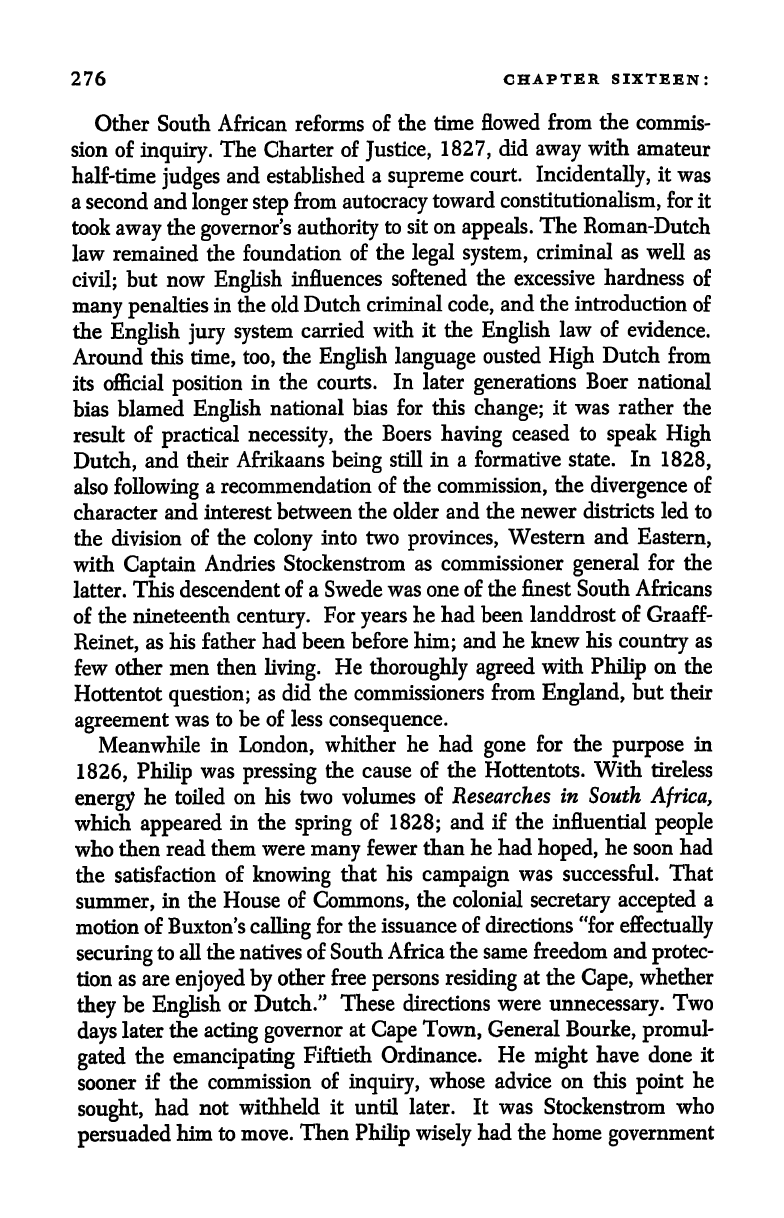
276
CHAPTER
SIXTEEN:
Other South African reforms
of
the
time
flowed
from the
commis-
sion
of
inquiry.
The
Charter
of
Justice,
1827,
did
away
with
amateur
half-time
judges
and established
a
supreme
court.
Incidentally,
it
was
a
second and
longer step
from
autocracy
toward
constitutionalism,
for
it
took
away
the
governor's
authority
to
sit on
appeals.
The
Roman-Dutch
law remained the
foundation
of
the
legal system,
criminal
as
well
as
civil;
but
now
English
influences
softened
the excessive hardness
of
many penalties
in die old
Dutch
criminal
code,
and
the
introduction
of
the
English
jury
system
carried
with it the
English
law of
evidence.
Around
this
time, too,
the
English language
ousted
High
Dutch
from
its official
position
in the courts.
In later
generations
Boer
national
bias
blamed
English
national
bias for this
change;
it was
rather
the
result
of
practical
necessity,
the
Boers
having
ceased
to
speak
High
Dutch,
and
their
Afrikaans
being
still
in a formative
state.
In
1828,
also
following
a recommendation
of the
commission,
the
divergence
of
character
and
interest
between
the
older
and
the newer
districts
led to
the division
of
the
colony
into
two
provinces,
Western
and
Eastern,
with
Captain
Andries
Stockenstrom
as
commissioner
general
for
the
latter.
This
descendent of
a Swede
was one
of the
finest South Africans
of the
nineteenth
century.
For
years
he had been
landdrost of Graaff-
Reinet,
as
his
father had been
before
him;
and he knew
his
country
as
few
other men
then
living.
He
thoroughly agreed
with
Philip
on the
Hottentot
question;
as
did
the
commissioners
from
England,
but their
agreement
was
to
be
of less
consequence.
Meanwhile
in
London,
whither
he
had
gone
for the
purpose
in
1826,
Philip
was
pressing
the cause
of the
Hottentots. With
tireless
energy
he
toiled
on his two volumes
of
Researches
in
South
Africa,
which
appeared
in the
spring
of
1828;
and if
the influential
people
who
then
read
them were
many
fewer
than he had
hoped,
he soon had
the satisfaction
of
knowing
that
his
campaign
was successful.
That
summer,
in the House
of
Commons,
the colonial
secretary
accepted
a
motion
of
Buxton's
calling
for
the
issuance
of directions
"for
effectually
securing
to all
the
natives of South
Africa the same freedom and
protec-
tion
as are
enjoyed
by
other
free
persons residing
at
the
Cape,
whether
they
be
English
or
Dutch."
These
directions
were
unnecessary.
Two
days
later
the
acting
governor
at
Cape
Town,
General
Bourke,
promul-
gated
the
emancipating
Fiftieth Ordinance.
He
might
have done
it
sooner
if
the
commission
of
inquiry,
whose advice
on this
point
he
sought,
had
not
withheld
it
until
later.
It
was
Stockenstrom
who
persuaded
him
to
move.
Then
Philip wisely
had
the
home
government
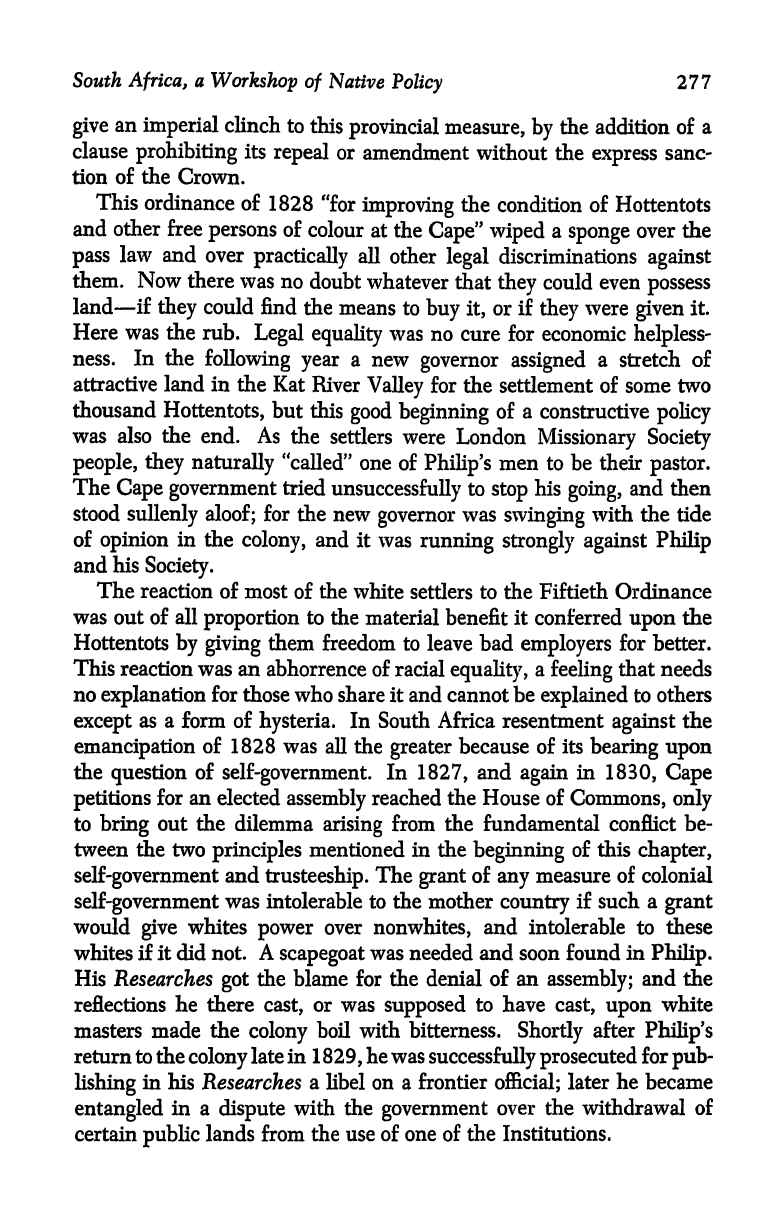
South
Africa,
a
Workshop of
Native
Policy
277
give
an
imperial
clinch
to
this
provincial
measure,
by
the
addition
of
a
clause
prohibiting
its
repeal
or
amendment without the
express
sanc-
tion
of the
Crown.
This
ordinance
of
1828
"for
improving
the condition of Hottentots
and
other
free
persons
of
colour at
the
Cape"
wiped
a
sponge
over the
pass
law and over
practically
all
other
legal
discriminations
against
them.
Now there
was
no
doubt
whatever
that
they
could even
possess
land
if
they
could
find
the
means to
buy
it,
or if
they
were
given
it.
Here was
the rub.
Legal
equality
was no
cure for economic
helpless-
ness.
In the
following
year
a new
governor
assigned
a
stretch
of
attractive land in the
Kat
River
Valley
for the settlement of some two
thousand
Hottentots,
but this
good
beginning
of
a
constructive
policy
was also
the
end. As
the
settlers
were London
Missionary
Society
people,
they
naturally
"called" one
of
Philip's
men
to be their
pastor.
The
Cape
government
tried
unsuccessfully
to
stop
his
going,
and then
stood
sullenly
aloof;
for
the new
governor
was
swinging
with
the
tide
of
opinion
in
the
colony,
and it was
running
strongly
against
Philip
and
his
Society.
The reaction of
most
of
the
white
settlers
to the
Fiftieth
Ordinance
was
out
of all
proportion
to
the
material
benefit
it
conferred
upon
the
Hottentots
by
giving
them freedom to
leave
bad
employers
for
better.
This
reaction was an
abhorrence
of
racial
equality,
a
feeling
that needs
no
explanation
for
those who share
it
and
cannot
be
explained
to others
except
as
a
form
of
hysteria.
In South Africa resentment
against
the
emancipation
of 1828 was
all
the
greater
because of
its
bearing upon
the
question
of
self-government.
In
1827,
and
again
in
1830,
Cape
petitions
for
an
elected
assembly
reached
the
House of
Commons,
only
to
bring
out the
dilemma
arising
from the fundamental conflict be-
tween the
two
principles
mentioned in
the
beginning
of this
chapter,
self-government
and
trusteeship.
The
grant
of
any
measure of colonial
self-government
was intolerable
to the mother
country
if such
a
grant
would
give
whites
power
over
nonwhites,
and intolerable to
these
whites if
it
did not.
A
scapegoat
was
needed
and
soon
found
in
Philip.
His Researches
got
the
blame for
the denial of
an
assembly;
and the
reflections
he
there
cast,
or was
supposed
to
have
cast,
upon
white
masters made
the
colony
boil
with
bitterness.
Shortly
after
Philip's
return
to
the
colony
late
in 1
829,
he
was
successfully prosecuted
for
pub-
lishing
in his Researches
a
libel on a
frontier
official;
later
he
became
entangled
in a
dispute
with the
government
over the withdrawal
of
certain
public
lands from the use of one
of
the Institutions.
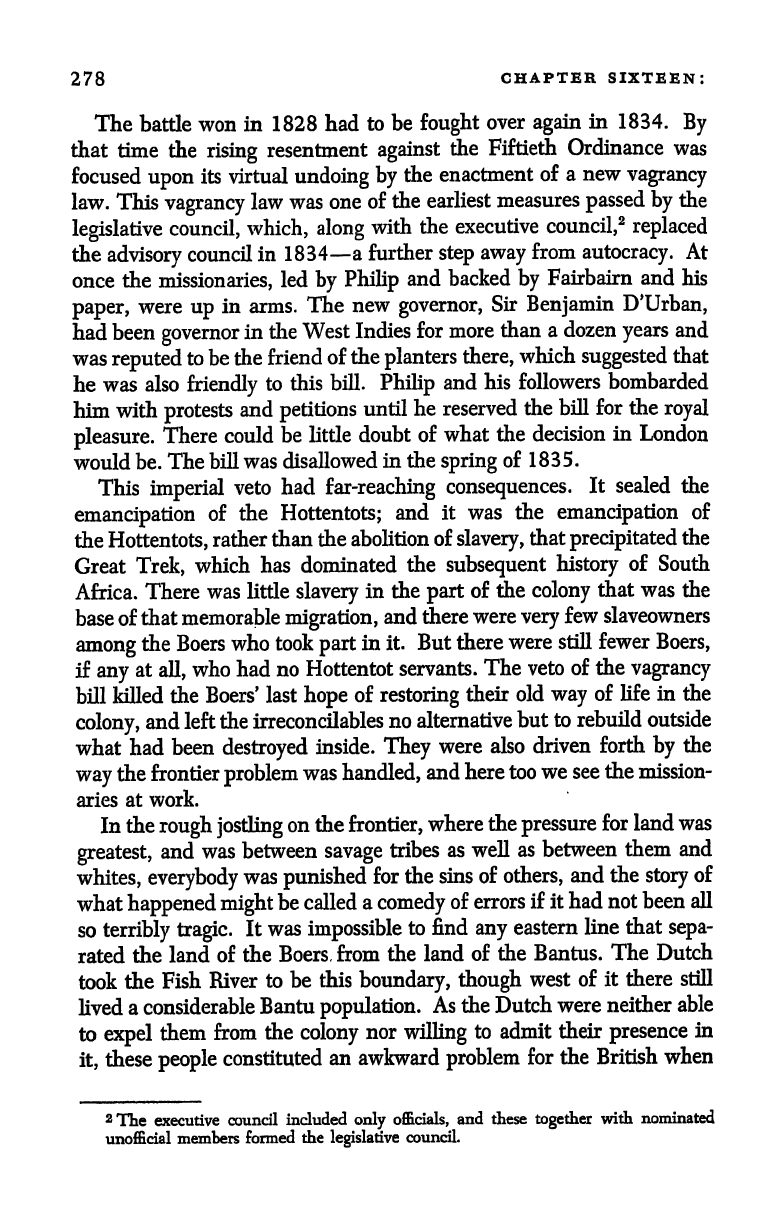
278
CHAPTER
SIXTEEN:
The
battle won
in 1828
had
to be
fought
over
again
in
1834.
By
that
time the
rising
resentment
against
the
Fiftieth
Ordinance
was
focused
upon
its
virtual
undoing
by
the
enactment
of
a
new
vagrancy
law. This
vagrancy
law
was
one
of
the
earliest
measures
passed by
the
legislative
council,
which,
along
with
the executive
council,
2
replaced
the
advisory
council
in 1834
a further
step
away
from
autocracy.
At
once
the
missionaries,
led
by
Philip
and
backed
by
Fairbairn
and his
paper,
were
up
in arms.
The
new
governor,
Sir
Benjamin
D'Urban,
had
been
governor
in
the
West
Indies
for
more
than a
dozen
years
and
was
reputed
to be the
friend
of
the
planters
there,
which
suggested
that
he
was also
friendly
to
this bill.
Philip
and
his
followers
bombarded
him with
protests
and
petitions
until
he reserved
the bill
for the
royal
pleasure.
There
could
be
little
doubt of
what
the decision
in
London
would
be.
The
bill
was
disallowed
in the
spring
of
1835.
This
imperial
veto
had
far-reaching
consequences.
It sealed the
emancipation
of
the
Hottentots;
and
it
was the
emancipation
of
the
Hottentots,
rather
than the
abolition
of
slavery,
that
precipitated
the
Great
Trek,
which
has dominated
the
subsequent
history
of South
Africa.
There
was
little
slavery
in
the
part
of
the
colony
that
was the
base of
that memorable
migration,
and
there
were
very
few
slaveowners
among
the
Boers
who
took
part
in it.
But
there
were
still
fewer
Boers,
if
any
at
all,
who had
no
Hottentot
servants.
The veto
of the
vagrancy
bill
killed
the
Boers'
last
hope
of
restoring
their old
way
of life
in the
colony,
and
left
the irreconcilables
no
alternative
but
to
rebuild outside
what
had
been
destroyed
inside.
They
were also driven
forth
by
the
way
the
frontier
problem
was
handled,
and here
too
we see
the mission-
aries
at work.
In
the
rough
jostling
on
the
frontier,
where
the
pressure
for land
was
greatest,
and
was between
savage
tribes
as well
as between
them
and
whites,
everybody
was
punished
for the
sins of
others,
and
the
story
of
what
happened
might
be called
a
comedy
of errors
if it had not
been all
so
terribly tragic.
It
was
impossible
to
find
any
eastern line
that
sepa-
rated
the
land
of
the
Boers,
from
the land
of
the
Bantus.
The
Dutch
took
the
Fish
River
to
be
this
boundary, though
west
of
it there
still
lived
a
considerable
Bantu
population.
As the Dutch
were
neither
able
to
expel
them
from
the
colony
nor
willing
to admit their
presence
in
it,
these
people
constituted
an awkward
problem
for the
British
when
2
The
executive
council
included
only
officials,
and
these
together
with
nominated
unofficial
members
formed
the
legislative
council.
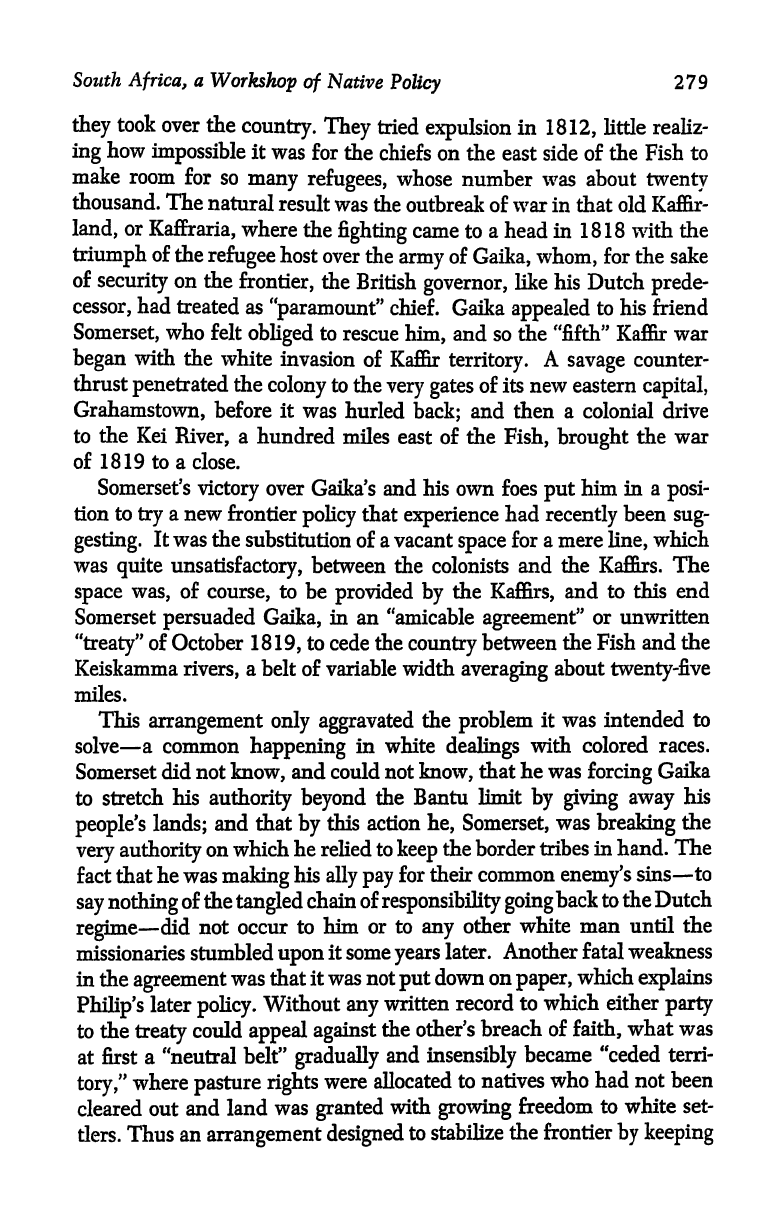
South
Africa,
a
Workshop
of
Native
Policy
279
they
took
over
the
country.
They
tried
expulsion
in
1812,
little
realiz-
ing
how
impossible
it
was for
the
chiefs on the
east
side
of
the
Fish
to
make
room
for
so
many
refugees,
whose
number
was
about
twenty
thousand. The
natural
result
was the outbreak
of
war
in
that
old
Kaffir-
land,
or
Kaffraria,
where
the
fighting
came
to
a
head in
1818 with
the
triumph
of
the
refugee
host over
the
army
of
Gaika, whom,
for
the sake
of
security
on
the
frontier,
the
British
governor,
like his Dutch
prede-
cessor,
had
treated as
"paramount"
chief.
Gaika
appealed
to his friend
Somerset,
who felt
obliged
to
rescue
him,
and
so
the "fifth" Kaffir
war
began
with
the white
invasion
of Kaffir
territory.
A
savage
counter-
thrust
penetrated
the
colony
to the
very
gates
of
its new eastern
capital,
Grahamstown,
before
it
was
hurled
back;
and
then a colonial drive
to
the
Kei
River,
a
hundred miles
east
of
the
Fish,
brought
the
war
of 1819
to a
close.
Somerset's
victory
over
Gaika's and his own foes
put
him in
a
posi-
tion to
try
a new
frontier
policy
that
experience
had
recently
been
sug-
gesting.
It
was the
substitution
of
a vacant
space
for a mere
line,
which
was
quite
unsatisfactory,
between
the colonists
and
the
Kaffirs.
The
space
was,
of
course,
to be
provided by
the
Kaffirs,
and
to
this end
Somerset
persuaded
Gaika,
in an "amicable
agreement"
or
unwritten
"treaty"
of October
1819,
to
cede
the
country
between
the Fish and
the
Keiskamma
rivers,
a belt
of
variable width
averaging
about
twenty-five
miles.
This
arrangement
only
aggravated
the
problem
it
was intended
to
solve
a
common
happening
in white
dealings
with colored
races.
Somerset
did not
know,
and
could not
know,
that
he was
forcing
Gaika
to stretch
his
authority beyond
the
Bantu
limit
by
giving
away
his
people's
lands;
and
that
by
this action
he,
Somerset,
was
breaking
the
very authority
on
which he relied to
keep
the border
tribes
in hand.
The
fact that he was
making
his
ally pay
for
their common
enemy's
sins
to
say
nothing
of
the
tangled
chain
of
responsibility going
back to the
Dutch
regime
did
not occur
to
him or to
any
other
white man until
the
missionaries
stumbled
upon
it some
years
later.
Another fatal
weakness
in the
agreement
was
that
it was not
put
down
on
paper,
which
explains
Philip's
later
policy.
Without
any
written record to
which either
party
to
the
treaty
could
appeal
against
the
other's
breach of
faith,
what
was
at first
a
"neutral
belt"
gradually
and
insensibly
became "ceded terri-
tory,"
where
pasture
rights
were
allocated
to
natives
who had not been
cleared out
and land
was
granted
with
growing
freedom
to
white
set-
tlers.
Thus an
arrangement
designed
to
stabilize
the
frontier
by keeping
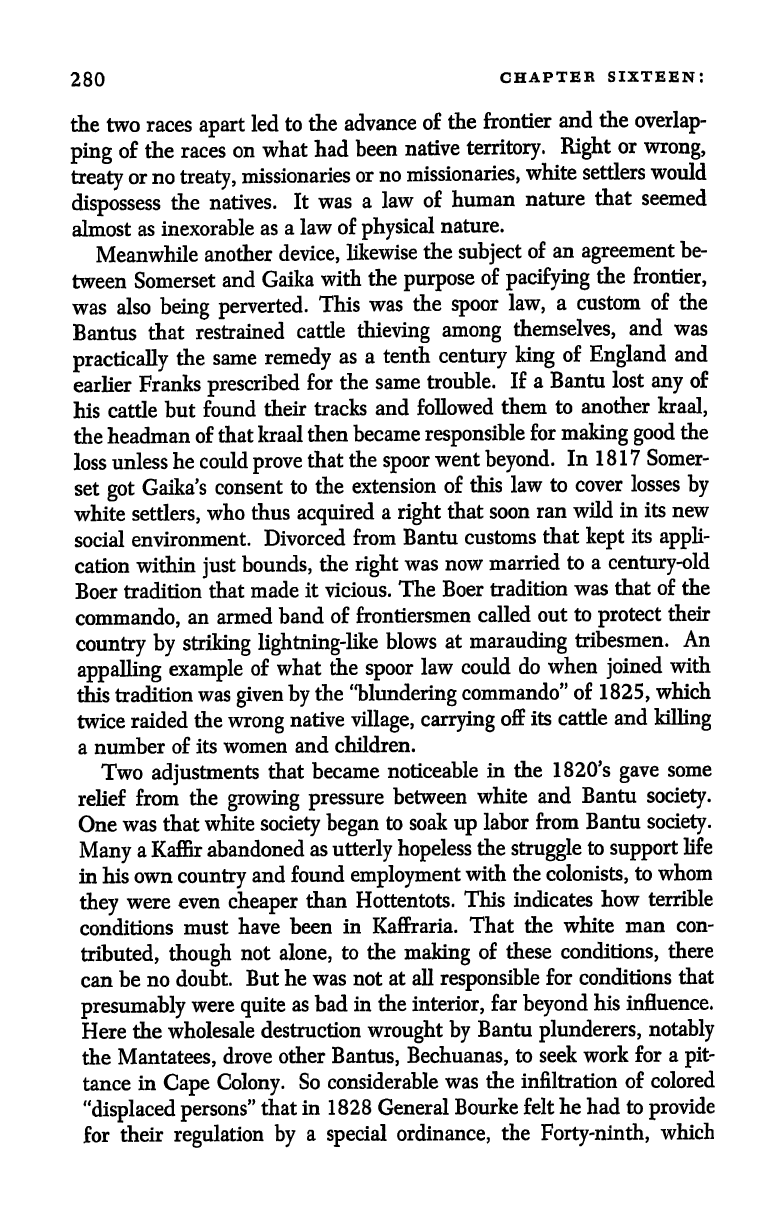
280
CHAPTER
SIXTEEN:
the two
races
apart
led
to
the advance
of
the
frontier
and
the
overlap-
ping
of the
races
on
what
had
been
native
territory,
Right
or
wrong,
treaty
or no
treaty,
missionaries
or
no
missionaries,
white
settlers
would
dispossess
the
natives.
It
was
a law
of
human
nature
that
seemed
almost
as
inexorable
as
a law
of
physical
nature.
Meanwhile
another
device,
likewise
the
subject
of
an
agreement
be-
tween
Somerset
and Gaika
with
the
purpose
of
pacifying
the
frontier,
was
also
being
perverted.
This
was
the
spoor
law,
a custom
of
the
Bantus
that
restrained
cattle
thieving
among
themselves,
and
was
practically
the
same
remedy
as
a
tenth
century
king
of
England
and
earlier
Franks
prescribed
for
the
same
trouble.
If
a
Bantu
lost
any
of
his
cattle
but
found
their
tracks
and
followed
them
to
another
kraal,
the
headman
of
that
kraal
then
became
responsible
for
making
good
the
loss
unless
he
could
prove
that
the
spoor
went
beyond.
In
1
8 1 7 Somer-
set
got
Gaika's
consent
to
the extension
of
this
law
to
cover
losses
by
white
settlers,
who
thus
acquired
a
right
that
soon
ran wild
in its new
social
environment.
Divorced
from
Bantu
customs
that
kept
its
appli-
cation
within
just
bounds,
the
right
was now
married
to
a
century-old
Boer
tradition
that
made
it
vicious.
The Boer
tradition
was
that of the
commando,
an armed
band
of frontiersmen
called
out
to
protect
their
country
by
striking
lightning-like
blows
at
marauding
tribesmen.
An
appalling
example
of
what die
spoor
law
could do
when
joined
with
this
tradition
was
given
by
the
"blundering
commando"
of
1825,
which
twice
raided
the
wrong
native
village,
carrying
off
its cattle
and
killing
a
number
of
its
women
and children.
Two
adjustments
that
became
noticeable
in
the
1820's
gave
some
relief
from
the
growing
pressure
between
white
and
Bantu
society.
One
was that
white
society began
to soak
up
labor
from
Bantu
society.
Many
a
Kaffir abandoned
as
utterly hopeless
the
struggle
to
support
life
in
his
own
country
and
found
employment
with
the
colonists,
to
whom
they
were
even
cheaper
than
Hottentots.
This indicates
how
terrible
conditions
must have
been
in
Kaffraria.
That the white
man
con-
tributed,
though
not
alone,
to
the
making
of
these
conditions,
there
can
be no
doubt.
But
he
was
not
at all
responsible
for conditions
that
presumably
were
quite
as bad
in
the
interior,
far
beyond
his influence.
Here
the
wholesale
destruction
wrought
by
Bantu
plunderers,
notably
the
Mantatees,
drove
other
Bantus,
Bechuanas,
to
seek work
for
a
pit-
tance
in
Cape
Colony.
So
considerable
was
the
infiltration of colored
"displaced
persons"
that
in 1828
General
Bourke
felt he had
to
provide
for
their
regulation
by
a
special
ordinance,
the
Forty-ninth,
which
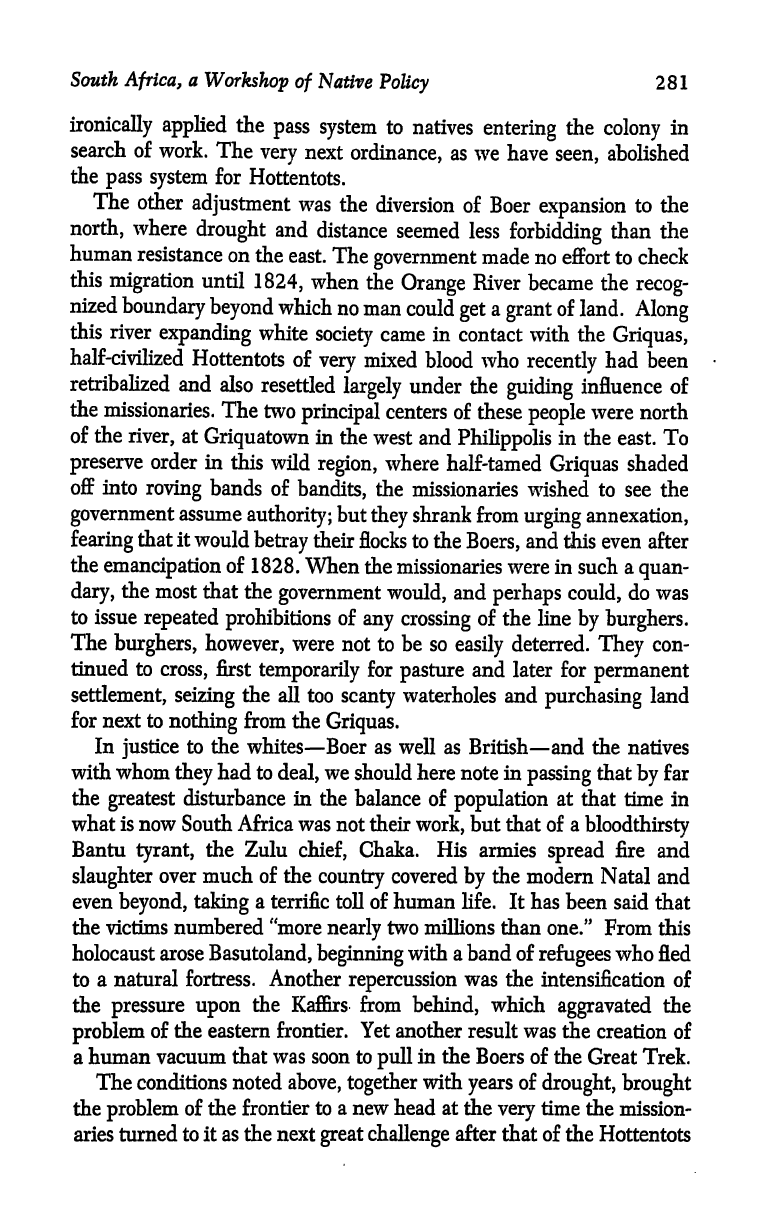
South
Africa,
a
Workshop
of
Native
Policy
281
ironically
applied
the
pass
system
to
natives
entering
the
colony
in
search
of
work.
The
very
next
ordinance,
as
we
have
seen,
abolished
the
pass
system
for
Hottentots.
The
other
adjustment
was
the
diversion
of Boer
expansion
to the
north,
where
drought
and
distance
seemed less
forbidding
than the
human
resistance
on
the
east.
The
government
made no
effort
to
check
this
migration
until
1824,
when
the
Orange
River
became the
recog-
nized
boundary
beyond
which
no man
could
get
a
grant
of
land.
Along
this river
expanding
white
society
came in
contact
with
the
Griquas,
half-civilized
Hottentots
of
very
mixed
blood who
recently
had been
retribalized
and
also
resettled
largely
under
the
guiding
influence of
the
missionaries. The
two
principal
centers
of these
people
were north
of
the
river,
at
Griquatown
in
the
west and
Philippolis
in
the east. To
preserve
order
in
this
wild
region,
where
half-tamed
Griquas
shaded
off
into
roving
bands
of
bandits,
the
missionaries
wished to see
the
government
assume
authority;
but
they
shrank
from
urging
annexation,
fearing
that it
would
betray
their
flocks to
the
Boers,
and this even after
the
emancipation
of
1828.
When
the
missionaries
were
in
such a
quan-
dary,
the
most
that
the
government
would,
and
perhaps
could,
do was
to
issue
repeated
prohibitions
of
any
crossing
of
the
line
by
burghers.
The
burghers,
however,
were
not to be so
easily
deterred.
They
con-
tinued to
cross,
first
temporarily
for
pasture
and later for
permanent
settlement,
seizing
the
all too
scanty
waterholes and
purchasing
land
for next
to
nothing
from
the
Griquas.
In
justice
to the
whites Boer
as
well as British
and
the
natives
with whom
they
had to
deal,
we
should here note in
passing
that
by
far
the
greatest
disturbance in the
balance of
population
at
that
time in
what is now
South Africa was
not
their
work,
but that of
a
bloodthirsty
Bantu
tyrant,
the Zulu
chief,
Chaka. His armies
spread
fire
and
slaughter
over much
of the
country
covered
by
the
modern
Natal and
even
beyond, taking
a
terrific
toll of
human
life.
It has
been
said that
the
victims numbered "more
nearly
two millions than
one."
From this
holocaust arose
Basutoland,
beginning
with
a band of
refugees
who
fled
to
a
natural fortress.
Another
repercussion
was the
intensification
of
the
pressure
upon
the
Kaffirs from
behind,
which
aggravated
the
problem
of
the eastern
frontier.
Yet
another result
was the
creation of
a
human vacuum
that
was soon
to
pull
in
the
Boers of
the
Great
Trek.
The
conditions noted
above,
together
with
years
of
drought,
brought
the
problem
of
the frontier to
a
new head
at
the
very
time
the mission-
aries turned
to it as the
next
great
challenge
after
that
of the
Hottentots
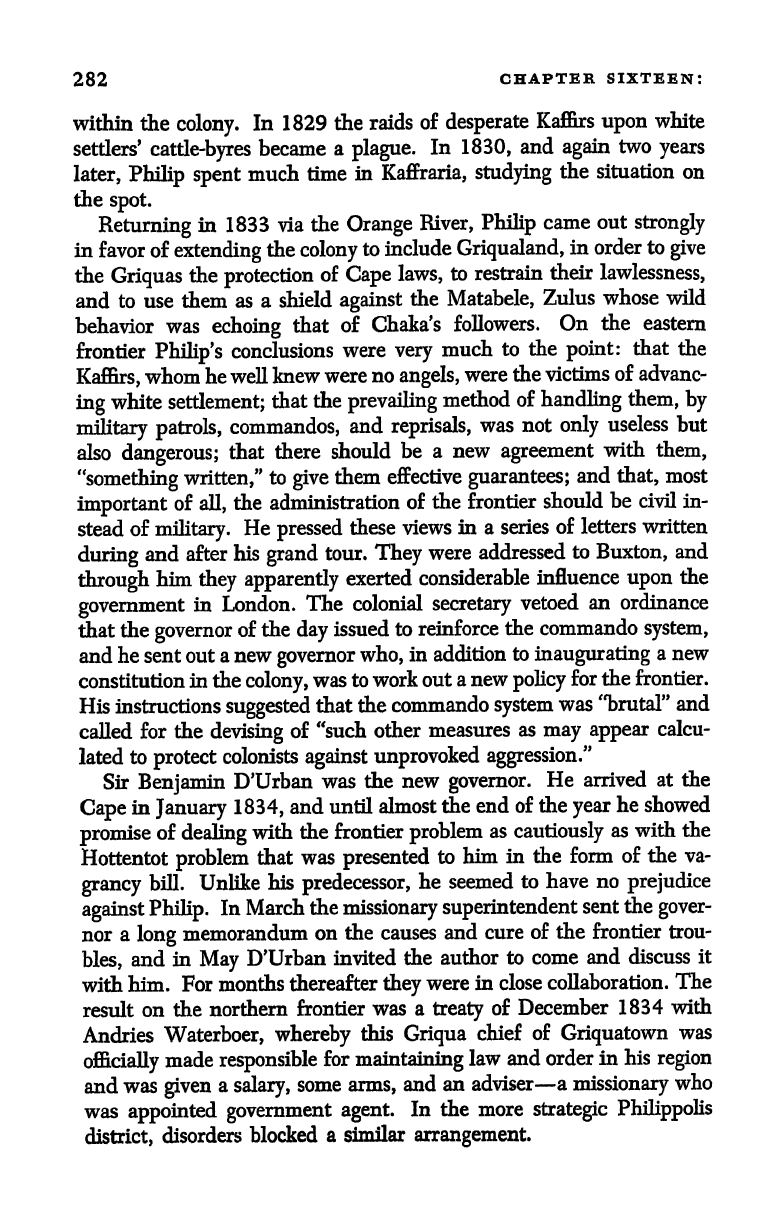
282
CHAPTER SIXTEEN:
within the
colony.
In
1829
the
raids
of
desperate
Kaffirs
upon
white
settlers'
cattle-byres
became
a
plague.
In
1830,
and
again
two
years
later,
Philip spent
much
time
in
Kaffraria,
studying
the
situation
on
the
spot.
Returning
in 1833 via
the
Orange
River,
Philip
came
out
strongly
in
favor of
extending
the
colony
to
include
Griqualand,
in order to
give
the
Griquas
the
protection
of
Cape
laws,
to
restrain
their
lawlessness,
and
to
use them as
a shield
against
the
Matabele,
Zulus
whose
wild
behavior
was
echoing
that
of
Chaka's
followers.
On
the
eastern
frontier
Philip's
conclusions
were
very
much
to
the
point:
that
the
Kaffirs,
whom
he well
knew
were no
angels,
were the
victims
of
advanc-
ing
white
settlement;
that
the
prevailing
method of
handling
them,
by
military
patrols,
commandos,
and
reprisals,
was
not
only
useless
but
also
dangerous;
that
there should
be
a
new
agreement
with
them,
"something
written,"
to
give
them
effective
guarantees;
and
that,
most
important
of
all,
the administration
of
the
frontier
should
be
civil in-
stead
of
military.
He
pressed
these views
in a series
of
letters written
during
and
after
his
grand
tour.
They
were
addressed
to
Buxton,
and
through
him
they apparently
exerted
considerable
influence
upon
the
government
in
London.
The colonial
secretary
vetoed
an ordinance
that
the
governor
of
the
day
issued
to
reinforce
the commando
system,
and
he sent out
a
new
governor
who,
in addition
to
inaugurating
a new
constitution
in the
colony,
was
to
work out
a new
policy
for the
frontier.
His
instructions
suggested
that the
commando
system
was
"brutal"
and
called
for
the
devising
of
"such
other
measures
as
may
appear
calcu-
lated to
protect
colonists
against
unprovoked
aggression."
Sir
Benjamin
D'Urban
was
the
new
governor.
He arrived
at
the
Cape
in
January
1834,
and until
almost
the
end
of
the
year
he showed
promise
of
dealing
with
the frontier
problem
as
cautiously
as
with the
Hottentot
problem
that was
presented
to
him
in the form
of
the va-
grancy
bill.
Unlike
his
predecessor,
he
seemed
to
have
no
prejudice
against
Philip.
In
March the
missionary
superintendent
sent
the
gover-
nor
a
long
memorandum
on
the causes
and
cure
of
the frontier trou-
bles,
and in
May
D'Urban
invited the
author
to
come
and
discuss
it
with
him.
For
months thereafter
they
were in close
collaboration.
The
result
on
the
northern
frontier
was a
treaty
of
December
1834
with
Andries
Waterboer,
whereby
this
Griqua
chief
of
Griquatown
was
officially
made
responsible
for
maintaining
law
and order
in
his
region
and
was
given
a
salary,
some
arms,
and
an
adviser
a
missionary
who
was
appointed
government
agent.
In
the more
strategic
Philippolis
district,
disorders
blocked
a
similar
arrangement.
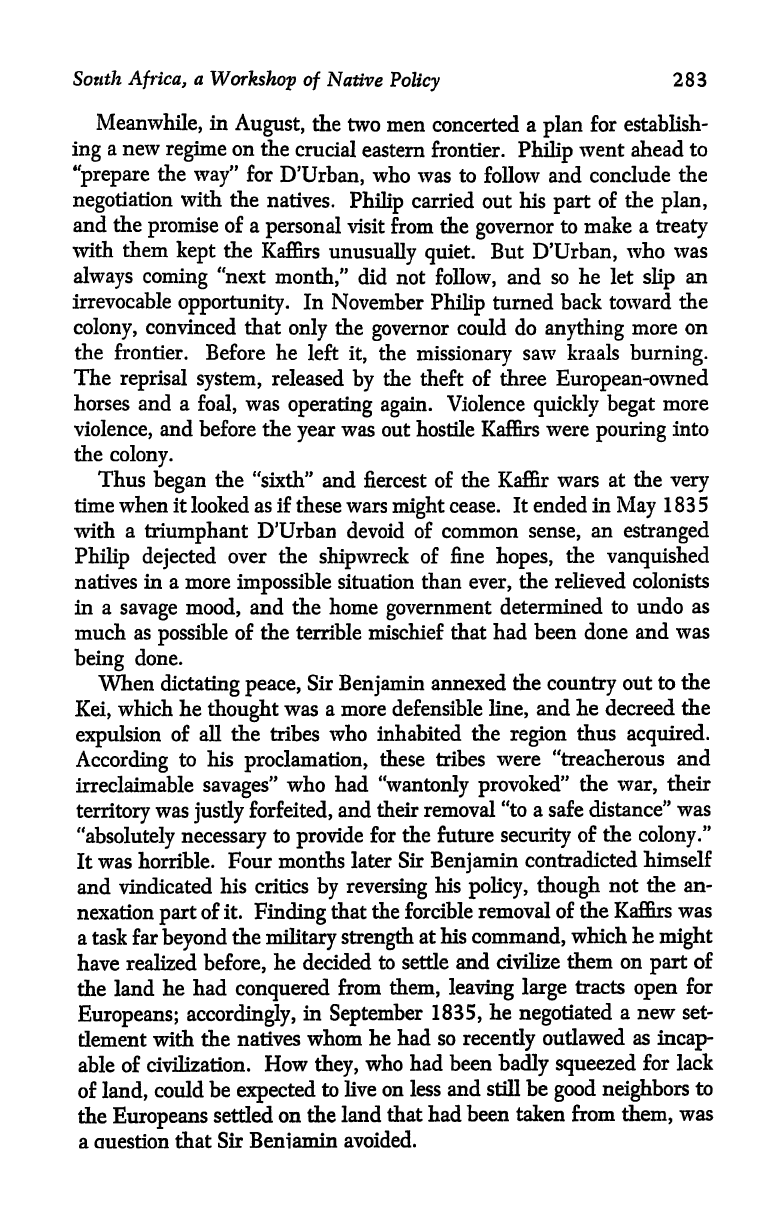
South
Africa,
a
Workshop
of
Native
Policy
283
Meanwhile,
in
August,
the
two
men concerted a
plan
for
establish-
ing
a
new
regime
on
the
crucial eastern frontier.
Philip
went ahead
to
"prepare
the
way"
for
D'Urban,
who
was to
follow and
conclude
the
negotiation
with
the
natives.
Philip
carried
out
his
part
of
the
plan,
and the
promise
of a
personal
visit
from
the
governor
to
make
a
treaty
with
them
kept
the
Kaffirs
unusually
quiet.
But
D'Urban,
who
was
always
coming
"next
month,"
did not
follow,
and
so he
let
slip
an
irrevocable
opportunity.
In
November
Philip
turned
back
toward
the
colony,
convinced that
only
the
governor
could do
anything
more
on
the frontier.
Before he
left
it,
the
missionary
saw
kraals
burning.
The
reprisal
system,
released
by
the theft
of three
European-owned
horses and a
foal,
was
operating again.
Violence
quickly begat
more
violence,
and
before the
year
was
out
hostile
Kaffirs were
pouring
into
the
colony.
Thus
began
the
"sixth" and fiercest of
the Kaffir wars
at
the
very
time
when
it
looked
as if
these wars
might
cease. It
ended in
May
1835
with
a
triumphant
D'Urban devoid of common
sense,
an
estranged
Philip dejected
over the
shipwreck
of fine
hopes,
the
vanquished
natives in a more
impossible
situation
than
ever,
the
relieved colonists
in a
savage
mood,
and the home
government
determined
to undo
as
much
as
possible
of
the terrible mischief
that had been
done
and was
being
done.
When
dictating peace,
Sir
Benjamin
annexed
the
country
out to
the
Kei,
which
he
thought
was
a
more defensible
line,
and he decreed
the
expulsion
of all
the
tribes
who inhabited
the
region
thus
acquired.
According
to
his
proclamation,
these tribes
were "treacherous
and
irreclaimable
savages"
who
had
"wantonly
provoked"
the
war,
their
territory
was
justly
forfeited,
and
their removal
"to a safe distance"
was
"absolutely necessary
to
provide
for
the future
security
of
the
colony."
It was
horrible. Four
months later
Sir
Benjamin
contradicted
himself
and
vindicated
his critics
by reversing
his
policy,
though
not
the an-
nexation
part
of it.
Finding
that
the forcible
removal of
the
Kaffirs
was
a task
far
beyond
the
military strength
at his
command,
which he
might
have realized
before,
he decided
to settle
and civilize
them on
part
of
the land
he
had
conquered
from
them,
leaving large
tracts
open
for
Europeans;
accordingly,
in
September
1835,
he
negotiated
a new set-
dement
with the
natives
whom
he had
so
recently
outlawed as
incap-
able of
civilization.
How
they,
who
had been
badly
squeezed
for lack
of
land,
could
be
expected
to
live
on less
and still be
good
neighbors
to
the
Europeans
settled
on the
land
that had
been taken from
them,
was
a Question that
Sir
Beniamin
avoided.
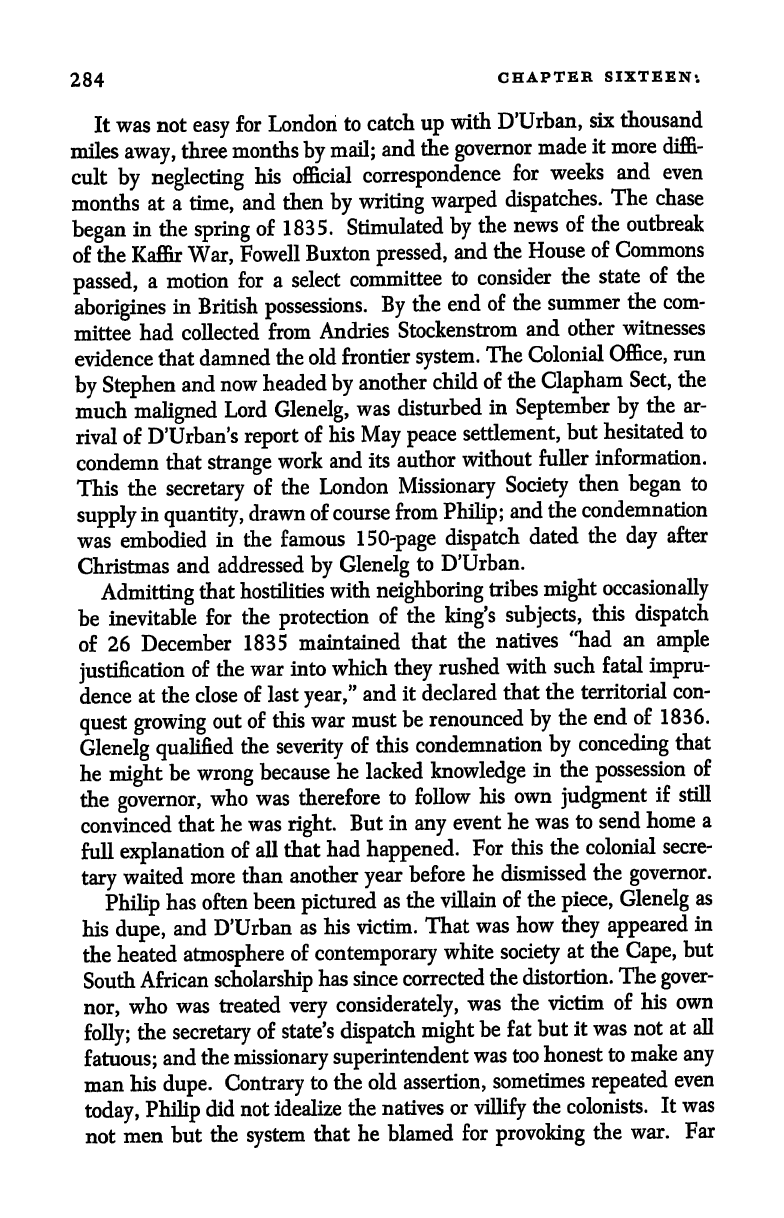
284
CHAPTER
SIXTEEN:
It was
not
easy
for
London
to
catch
up
with
D'Urban,
six
thousand
miles
away,
three
months
by
mail;
and
the
governor
made
it more diffi-
cult
by
neglecting
his
official
correspondence
for
weeks
and
even
months
at
a
time,
and
then
by
writing
warped
dispatches.
The chase
began
in the
spring
of
1835.
Stimulated
by
the
news
of
the
outbreak
of
the Kaffir
War,
Powell
Buxton
pressed,
and
the
House
of
Commons
passed,
a motion
for
a select
committee
to
consider
the
state
of the
aborigines
in British
possessions.
By
the
end
of
the
summer
the com-
mittee
had
collected
from
Andries
Stockenstrom
and
other
witnesses
evidence
that
damned
the
old
frontier
system.
The
Colonial
Office,
run
by
Stephen
and
now
headed
by
another
child
of
the
Clapham
Sect,
the
much
maligned
Lord
Glenelg,
was
disturbed
in
September
by
the ar-
rival
of
D'Urban's
report
of
his
May
peace
settlement,
but
hesitated to
condemn
that
strange
work
and
its
author
without
fuller
information.
This
the
secretary
of
the
London
Missionary
Society
then
began
to
supply
in
quantity,
drawn
of
course
from
Philip;
and
the
condemnation
was
embodied
in
the famous
150-page
dispatch
dated
the
day
after
Christmas
and
addressed
by
Glenelg
to
D'Urban.
Admitting
that hostilities
with
neighboring
tribes
might
occasionally
be
inevitable
for
the
protection
of
the
king's
subjects,
this
dispatch
of
26
December
1835
maintained
that
the
natives
"had
an
ample
justification
of
the
war into
which
they
rushed
with
such
fatal
impru-
dence
at the
close
of last
year,"
and
it declared
that
the
territorial
con-
quest
growing
out
of
this
war
must
be
renounced
by
the
end
of
1836.
Glenelg
qualified
the
severity
of
this
condemnation
by
conceding
that
he
might
be
wrong
because
he lacked
knowledge
in the
possession
of
the
governor,
who
was
therefore
to follow
his
own
judgment
if
still
convinced
that
he
was
right.
But
in
any
event
he was
to
send
home
a
full
explanation
of all
that
had
happened.
For
this
the
colonial
secre-
tary
waited
more
than another
year
before
he dismissed
the
governor.
Philip
has
often
been
pictured
as the
villain
of
the
piece,
Glenelg
as
his
dupe,
and
D'Urban
as
his victim.
That
was how
they
appeared
in
the
heated
atmosphere
of
contemporary
white
society
at the
Cape,
but
South
African
scholarship
has
since corrected
the
distortion.
The
gover-
nor,
who
was
treated
very
considerately,
was
the
victim
of
his
own
folly;
the
secretary
of
state's
dispatch
might
be fat
but
it
was
not
at
all
fatuous;
and
the
missionary
superintendent
was
too
honest to
make
any
man
his
dupe.
Contrary
to
the
old
assertion,
sometimes
repeated
even
today,
Philip
did
not
idealize
the
natives
or
villify
the colonists.
It
was
not
men
but
the
system
that
he
blamed
for
provoking
the
war.
Far
